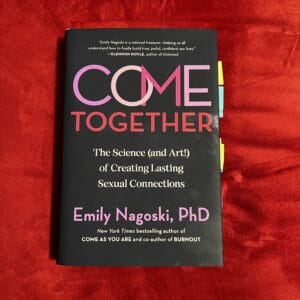Posts Tagged ‘books’
The Turned-On Couple by Corinne Farago
The Turned-On Couple
by Corinne Farago
Reviewed by Mac Marshall
Corinne Farago
“No matter how dry your sex life is right now, there’s a path forward for you as a couple.” (p.136)
Are you in a long-term marriage or partner relationship? Do you two bicker over small matters and often feel irritated with one another? Has the quality and frequency of your sex life fallen into a rut? If so, Corinne Farago’s book The Turned-On Couple may be just what you need.
In this book, Farago distills her coaching experiences into a self-help guidebook for relationship rejuvenation. She argues that we all crave relationship intimacy, but a couple’s level of intimacy may weaken over time. Honest communication can revive that intimacy. Intimacy in turn builds trust. Trust lets us be vulnerable. Vulnerability allows us to gain self-acceptance and discover our authentic sexual selves. That then frees us to communicate with our partner about what works for us sexually, and why.
Farago seeks to jolt those of us in long-term relationships who may have become “comfortably numb” to our partner. Her goal as a sex coach is to help couples manage problems she finds commonplace in long-term relationships. These include conflict mismanagement, communication difficulties, desire discrepancies, and lackluster sex lives.
The Turned-On Couple is divided into 65 brief chapters, each focused on a specific issue. These are sorted into three major sections, reminiscent of Timothy Leary’s famous counterculture-era phrase, “Turn on, tune in, drop out.” However, Farago wants us just to turn on, not to drop out. The book’s sections are:
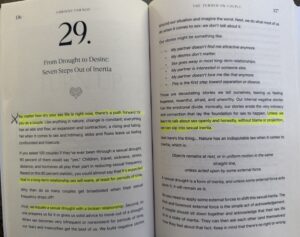
- Tune In (28 chapters): “You’ll learn about the essential skills of building a secure and loving foundation for your intimacy to thrive. Use these lessons to guide you and your partner in conversation, and discover how to build new habits in love that support your passion.”
- Turn Up (16 chapters): “We look at the often-mysterious world of desire, how to turn up your own desires, and how to confidently express those desires to your partner….Through practical guidance and reflective exercises, let’s explore how to turn up desire with authenticity, empathy, and vulnerability.”
- Turn On (21 chapters): “We embark on a voyage of exploration, shedding light on the secrets to cultivating a deeply satisfying and fulfilling sexual connection. From communication and vulnerability to pleasure and new adventures, let’s look at the essential elements that pave the way to becoming a Turned-On Couple.”
These chapters range from 2 to 6 pages. Farago has designed the book so that you can read it all the way through from front to back, or you can select particular chapters of interest. Every chapter contains ideas for solving particular problems. These examples convey the flavor of her suggestions:
“When couples learn how to talk about sex from a place of curiosity and playfulness, they realize that sex talk can be fun. Talk about what you like and want more of. Talk about sex after you have sex, and share your highlights. If sex has become boring, you know it’s time to start growing again.” (p.22)
- “In order to maintain mystery in a long-term relationship, you want an ongoing balance of attachment and independence….Find ways of taking space and doing your own thing. See friends, exercise, or start a new sport or hobby that engages you. Differentiate yourself from your partner in healthy ways. Romantic attachment is important to build trust and safety, but creating space from your partner is the necessary ingredient to building desire.” (p.86)
- “In long-term relationships, consent means more than just asking for sex; it’s asking about what kind of sex we want….It’s a conversation about needs and desires. It’s checking in with your partner and ensuring that you both have an opportunity to express an enthusiastic “yes” to what’s being offered, whether that’s a foot massage, intercourse, or something new on the erotic menu.” (p.274)
I have a mild criticism: what is meant by a “long-term relationship” is never specified. Five years? Fifteen years? Fifty years? We’re left to intuit this.
Although not written specifically for seniors, Farago’s focus on long-term relationships makes this book relevant to the many seniors who live in decades-long marriages. Others of us—widowed or divorced—develop what may become lengthy new relationships outside of marriage in our later years. In both circumstances, The Turned-On Couple offers much helpful advice to older adults.
Visit Corinne Farago’s website. Order The Turned-On Couple from your local bookseller, or Bookshop.org (which benefits indie booksellers), or Amazon.


Mac Marshall, PhD is a retired anthropology professor, researcher, and author who is delighted to explore sexuality studies at this time of his life.
Capture Your Sexy Stories by Stella Fosse
Capture Your Sexy Stories
guest post by Stella Fosse

Shoes, hose, suit jacket, pencil skirt, all were cast aside. Hands were everywhere: caressing breasts, touching shoulders, massaging buttocks. Rachel’s hands slid behind Marion’s head and pulled her close. She found Marion’s lips with her own, lips that tasted of time, the spices of long ago, the herbs in the garden of her burnt English cottage.
– From Vampires of a Certain Age by Stella Fosse

Stella Fosse
Writing about our vibrant lives can be fun and liberating. When I lead workshops on sexy writing for olders, that joyful energy is all around us. We have so much experience to draw upon, so many memories and ideas. Sharing our sexy stories as older adults sends a powerful anti-ageist message.
You need not consider yourself a writer to enjoy writing about vivid moments. Approach your writing as play. Remember a sexy experience from yesterday or half a century ago. Make a list of sensory words and phrases your memory conjures. Was there music? Were there sighs? Laughter? What aromas and tastes do you recall? What about textures and surfaces you touched? Take your time with this list-making; there is no rush.
Use your list of words and phrases as writing prompts for your sexy scene. Expand on each thought in any order you want, chronological or not. What you write is just for your enjoyment unless you choose to share it. Feel free to add ideas from your imagination. Then read your scene aloud and enjoy your words.
Write about new sexual experiences soon after they happen to keep those moments fresh on the page. Sharing this writing with your partner can be a sexy experience. Expand on your scene to create a story, as I wrote about in a previous post for Joan Price’s blog.
You may even publish your sexy story! Every once in a while, a call for submissions comes along for erotic stories with older characters. You might enjoy these anthologies of sexy stories (and they may inspire your writing):
enjoy these anthologies of sexy stories (and they may inspire your writing):
• Ageless Erotica, edited by Joan Price
• Dirty Old Women: Erotica by Women of Experience, edited by Lynx Canon
• Ladies’ Own Erotica, by the Kensington Ladies Erotica Society
• Unmasked: Women Write about Sex and Intimacy After Fifty, edited by Marcia Meier and Kathleen A. Barry
 My first book, Aphrodite’s Pen: The Power of Writing Erotica after Midlife, includes erotic stories with older characters and writing prompts that turn society’s expectations about older characters upside down.
My first book, Aphrodite’s Pen: The Power of Writing Erotica after Midlife, includes erotic stories with older characters and writing prompts that turn society’s expectations about older characters upside down.
My newest book is Write & Sell a Well-Seasoned Romance, a step-by-step guide to create, edit, publish and market a late life Romance novel. Designed for new writers as well as experienced authors. this how-to manual includes sexy example scenes from my novel, Vampires of a Certain Age. Most Romance readers are past midlife, yet few Romance characters are over thirty. Your stories can help!
market a late life Romance novel. Designed for new writers as well as experienced authors. this how-to manual includes sexy example scenes from my novel, Vampires of a Certain Age. Most Romance readers are past midlife, yet few Romance characters are over thirty. Your stories can help!
Rachel thrilled at the heightened sense of touch she experienced in Marion’s arms. “Kiss me again. Please. Give me your tongue.” With a low murmur, Marion did as she was asked. Still kissing, the two made their way to Marion’s bed, which was large and inviting, a slightly darker peach than the walls, with a generous silken canopy. Lying on it, Rachel felt as if she were floating in space. Marion’s body was strong and soft, new and somehow familiar.
– From Vampires of a Certain Age by Stella Fosse
Writing about joyful, sexy moments is a great antidote to the negativity about aging all around us. Erotic writing helps us see our sex lives in a positive way and contributes to our health and longevity. It’s a fun revolution. Try it and enjoy!

Stella Fosse encourages people after midlife to subvert ageism through writing and sharing our vivid stories. She leads workshops, writes both fiction and nonfiction, and blogs on topics of interest to olders. She is the author of Write & Sell a Well-Seasoned Romance, Aphrodite’s Pen, and two novels and a story collection, all featuring vivid older characters. She shares her writing and other resources at www.stellafosse.com
LATitude by Vicki Larson
LATitude: How You Can Make a Live Apart Relationship Work
by Vicki Larson
Reviewed by Mac Marshall

Vicki Larson, photo credit Kim Thompson Steel
LAT stands for Live Apart Together. In her welcome book about this new lifestyle, Vicki Larson notes that at least three things must occur for a relationship to be considered LAT:
- Two people agree that they are a committed romantic couple;
- Others view them as a committed romantic couple;
- They intentionally reside in separate homes.
LAT has grown in popularity in recent years, especially among divorced or widowed older adults. Many seniors find that living separately from their romantic partner provides an attractive combination: committed companionship along with personal independence.
 “There are several studies indicating that living apart from your romantic partner benefits your sex life,” says Larson. “LAT couples often experience more passion, idealize their partners more, daydream about their relationship, and report more loving feelings toward their partner than couples who live together.” Larson’s own interviews revealed that compared to couples who live together, LAT couples:
“There are several studies indicating that living apart from your romantic partner benefits your sex life,” says Larson. “LAT couples often experience more passion, idealize their partners more, daydream about their relationship, and report more loving feelings toward their partner than couples who live together.” Larson’s own interviews revealed that compared to couples who live together, LAT couples:
- Have the same or even higher levels of commitment;
- Feel equal or greater trust for their partners;
- Have the same or higher levels of stability;
- Experience equal or more relationship satisfaction.
LAT relationships typically offer a couple equality, intimacy, stability, and more satisfying sex than if they resided under one roof. “Absence not only seems to make the heart grow fonder, it also makes the libido stronger.”
Larson lists the reasons most people state for getting married: love, “lifelong commitment, companionship, children, having the relationship be recognized by a religious ceremony, financial stability, and…legal rights and benefits.” She notes that living together is not mentioned as a reason to wed. Indeed, “all the stated reasons for marrying can be achieved while living apart from your romantic partner.” In LATitude, she presents examples of married couples who actively choose to live apart happily, often for decades.
To succeed in a LAT relationship, you must feel secure in your sexual relationship. “Ultimately, it comes down to this: Are you with someone you trust, and is that person worthy of your trust? And are you someone your partner can trust?” With or without marriage, LAT rests on mutual trust to abide by whatever agreements and boundaries a couple establish, including whether to be monogamous or consensually non-monogamous. Larson quotes a therapist who is in a longtime LAT partnership: “Before you take this step, you have to be really secure in your relationship. The commitment you need in your relationship can’t be half-assed. It takes more trust when you’re not going to see the person and you have no idea what they’re doing all day or night.”
If you are a senior intrigued by or contemplating an LAT relationship, Larson’s book is essential reading. She also addresses financial matters, legal issues, and decisions about caregiving as aging partners require more assistance. These are especially relevant to our age group. You’ll come away from her book with a solid understanding of the pros and cons of LAT as you chart your own course.
Larson’s book is essential reading. She also addresses financial matters, legal issues, and decisions about caregiving as aging partners require more assistance. These are especially relevant to our age group. You’ll come away from her book with a solid understanding of the pros and cons of LAT as you chart your own course.
My own experience: I am 80 years old. I had two long marriages. The first one ended in divorce and the second with my wife’s death. I have no desire to remarry. As a widower I am now in a delightful and fulfilling LAT relationship. I find it satisfying in a host of ways. My partner and I each live in our own home and see one another several times a week, including one or two “overnights.” We communicate daily. We maintain our separate friendship networks, along with friends in common. Sometimes we travel together, sometimes solo. We keep our finances separate and often treat each other to dates or trips. We schedule regular sex dates in advance. The anticipation of such planned intimacy adds to the excitement. Disadvantages to LAT? I can’t think of any!
Do you have a LAT arrangement? I invite you to comment.

Mac Marshall, PhD is a retired anthropology professor, researcher, and author who is delighted to explore sexuality studies at this time of his life.

Purchase LATitude: How You Can Make a Live Apart Relationship Work from Bookshop.org. Visit Vicki Larson’s website.
Come Together by Emily Nagoski
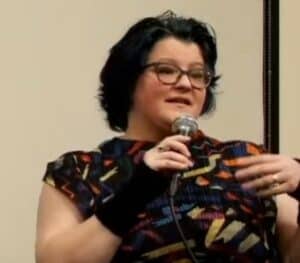
Emily Nagoski at Book Passage, Corte Madera, CA
Come Together: The Science (and Art) of Creating Lasting Sexual Connections
by Emily Nagoski, PhD
Reviewed by Mac Marshall
What is the key to passionate sex over the long term? Frequency? Orgasms? Novelty? Monogamy? Being a “skilled” lover?
Wrong, says Emily Nagoski, PhD in her new book, Come Together: The Science (and Art) of Creating Lasting Sexual Connections. Her goal is to give us the key to long-term satisfying sex. She writes,
Great sex in a long-term relationship is not about how much you desire sex or how often you have to do it. It’s not about what you do, in which position, with whom or where or in what clothes, even how many orgasms you have. It’s whether or not you like the sex you are having.
“Pleasure Is the Measure” is a major theme of Come Together. Pleasure is all about “how much you like the sex you’re having.” Most of the book teaches how to create access to pleasure with a long-term partner. Mutual admiration and trust are essential to this creative process.
Most of us seek both connection and pleasure in sexual relationships. But the excitement we feel when a relationship begins often fades as time goes by. Partners in committed relationships such as marriage frequently drift apart sexually. Typically, this is due to work pressures, the demands of family, and our physical changes as we age. Nagoski gives us helpful guidelines to revive and maintain connection and pleasure for the long haul.
haul.
Two chapters focus on what she calls “your emotional floorplan.” She bases this on the dual control model that she introduced in her best-known book, Come As You Are: turn-ons—the accelerator—and turn-offs—the brakes. The floorplan consists of seven emotional spaces that affect your sexuality: lust, care, play, rage, panic+grief, fear and seeking. She offers advice on how to navigate these emotional states as we construct a safe space with our partner for mutual sexual pleasure.
When people “come together” in partnerships Nagoski finds they seek:
- connection,
- shared pleasure,
- being wanted by another,
- freedom to feel full immersion in an erotic moment.
These are especially pertinent for relationships between seniors. Aging usually changes our needs for erotic connection. It is potentially empowering. For example, Nagoski observes:
[Aging provides] a context that encourages you to explore. Try new things. Shed all the preconceived ideas about how sex “should” work and experiment with all the ways it can and does work for you and your partners, in the bodies you have right now.
Come Together centers on persons of any gender in long-term relationships. She shows us ways to create partnerships that sustain a strong sexual connection. The partnership characteristics she focuses on are:
- they are friends
- they prioritize sex
- they pursue what’s genuinely true for them—what works in their unique relationship—rather than accepting other people’s opinions about how they’re supposed to do sex.
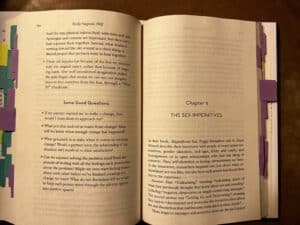
These characteristics flourish by avoiding “the desire imperative” and “the sex imperatives”:
- “The desire imperative” is the notion that we should feel a “spark” of spontaneous craving for sexual intimacy when a relationship begins. And if we don’t continue to feel that sparky desire, we’ve failed. The desire imperative pooh-poohs planning or preparing for sex, and if we and our partner don’t just spontaneously want each other effortlessly, we must not want each other enough. Against this “mess of wrongheadedness,” Nagoski centers pleasure as the alternative measure of sexual well-being.
- “The sex imperatives” that endanger lasting sexual connections are many, including these:
- the coital imperative (penis-in-vagina sex)
- the variety imperative (manual, oral, and anal play as well as PIV)
- the performance imperative (enhancing your sexual skill set)
- the monogamy imperative (you should only have one sexual relationship at a time)

Fixation on any or all of these can thwart success in building lasting sexual connections.
Change is an unavoidable given in life and relationships. Among the changes most of us encounter are illness, pain, and aging. Nagoski writes,
The key to sustaining a strong sexual connection over the long term is to adapt—with confidence, joy, and calm, warm curiosity—to the changes brought by each season of our lives.
To join together in a successful sexually rewarding long-term partnership, Nagoski champions trust, admiration, confidence and joy. She gives these tips for achieving mutual lasting pleasure and connection:
- Seek authenticity.
- Plan for and embrace the changes that will always occur.
- Find adaptations and adjustments that work for your unique situation.
Just as Nagoski’s Come as You Are is a ground-breaking book for women understanding their sexuality and achieving sexual pleasure, Come Together is the book you need to enrich the sexual joy in a long-term relationship. Read it — your sexual relationship will thank you!
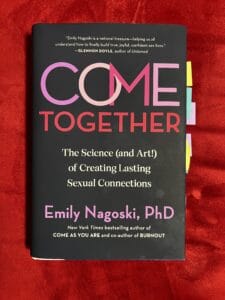
Purchase Come Together at your local independent bookstore or order from Bookshop.org or Amazon.
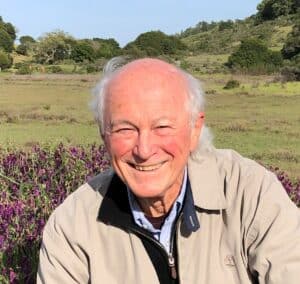
Mac Marshall, PhD is a retired anthropology professor, researcher, and author who is delighted to explore sexuality studies at this time of his life.



